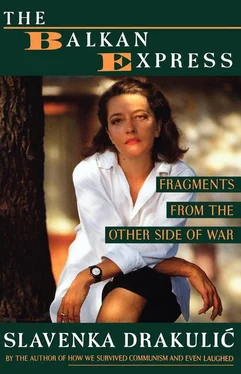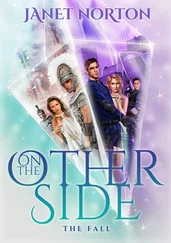Now I think I understand what I couldn’t understand before: how it happened that people who lived near German concentration camps didn’t do anything, didn’t help. In Claude Lanzmann’s long documentary on the Holocaust, Shoah , there is a scene of dialogue with one of the survivors from Chelmno, the place in Poland where Jews were first exterminated by gas, 400,000 of them.
‘It was always this peaceful here. Always. Even when they were burning 2000 people – Jews – every day, it was just as peaceful. No one protested. Everyone went about his work. It was silent. Peaceful. Just as it is now,’ he said.
And the survivor from Treblinka said: ‘We were in the wagon; the wagon was rolling eastwards. A funny thing happened, maybe it’s not nice to say it. Most of the people, not just the majority, but ninety-nine per cent of the Polish people when they saw the train going through… they were laughing, they were joyful because the Jewish people were being taken away.’
The third voice I remember is of a woman who lived through the war in hiding: ‘I remember the day when they made Berlin Judenrein . People hurried along the streets; no one wanted to be in the streets; you could see the streets were absolutely empty. They didn’t want to look, you know. They hastened to buy what they had to buy – they had to buy something for the Sunday, you see. So they went shopping, then hurried back to their houses. And I remember this day very vividly because we saw police cars rushing through the streets of Berlin taking people out of the houses.’
But maybe the best explanation as to why people didn’t stop the massacre is given by a Polish villager from present-day Treblinka who, in answer to the question whether they were afraid for the Jews, answered that if he cut his finger it hurt him, not the other person. Yes, they knew about the Jews, the convoys, the fact that they were taken into the camp and vanished. Poles worked their land right next to the barbed wire and heard awful screams. ‘At first it was unbearable. Then you got used to it,’ said yet another villager, a Pole. They were Jew’s, others, not-us. What had a Pole to do with the fact that Germans were killing Jews?
So we all get used to it. I understand now that nothing but this ‘otherness’ killed Jews, and it began with naming them, by reducing them to the other. Then everything became possible, even the worst atrocities like concentration camps or the slaughtering of civilians in Croatia or Bosnia. For Serbians, as for Germans, they are all others, not-us. For me, those others are refugees. For Europe, the ‘other’ is the lawless ‘Balkans’ they pretend not to understand. For the USA it’s more or less a ‘European problem’: why should they bother with the screams of thousands of people being bombed or simply dying of hunger, when those screams can hardly be heard? Let Europe do something, aren’t they working the land next to the barbed wire?
I don’t think our responsibility is the same – and I am not trying to equate the victims with those who murdered them in cold blood – all I’m saying is that it exists, this complicity: that out of opportunism and fear we all are becoming collaborators or accomplices in the perpetuation of war. For by closing our eyes, by continuing our shopping, by working our land, by pretending that nothing is happening, by thinking it is not our problem, we are betraying those ‘others’ – and I don’t know if there is a way out of it. What we fail to realize is that by such divisions we deceive ourselves too, exposing ourselves to the same possibility of becoming the ‘others’ in a different situation.
The last time I saw Drazena she told me she was okay. She is staying in a friend’s apartment until the autumn and free-lancing for a local newspaper. Afterwards she will manage to find something else. She also told me that she is writing a war diary since that is the only way she can attempt to understand what is happening to her. ‘And what I find most difficult to comprehend is the fact that there is a war going on,’ she said. ‘I still don’t understand it. It’s not that I expect a miracle to end this nightmare immediately. No, no. I mean, it is just hard for me to grasp that what is going on is the war. Do you know what a war is?’ she asked, but I could tell from her look that she didn’t really expect an answer.
I don’t know what the war is, I meant to tell her, but I can see that it is everywhere. It is in a street flooded with blood after twenty people have died in a bread queue in Sarajevo. But it is also in your not understanding it, in my unconscious cruelty towards you, in the fact that you have that yellow certificate and I don’t, in the way it is growing within us and changing our emotions, our relations, our values. We are the war; we carry in us the possibility of the mortal illness that is slowly reducing us to what we never thought possible and I am afraid there is no one else to blame. We all make it possible, we allow it to happen. Our defence is weak, as is our consciousness of it. There are no them and us, there are no grand categories, abstract numbers, black and white truths, simple facts. There is only us – and, yes, we are responsible for each other.
And I also wanted to tell Drazena that she should go out and dance in her high-heeled shoes, if only she could.
ZAGREB MAY 1992
Copyright © 1993 by Slavenka Drakulic
First American Edition 1993
A Dinner at the Harvard Club , Paris—Vukovar , It’s Hard to Kill a Man , My Mother Sits in the Kitchen Smoking Nervously , An Actress Who Lost Her Homeland , If I had a Son , What Ivan Said translated from the Croatian by Maja Soljan
All rights reserved
Printed in the United States of America
Manufacturing by The Haddon Craftsmen Inc.
Library of Congress Cataloging-in-Publication Data
Drakulić, Slavenka, 1949-
Balkan express : fragments from the other side of war / Slavenka Drakulic. – 1st American ed.
p. cm.
Includes index.
1. Yugoslavia—History—Civil War, 1991- 2. Drakulic, Slavenka, 1949- . I. Title.
DRI3I3.D73 1993 949.702’4—dc20 92-42505
ISBN 0-393-03496-8
W.W. Norton & Company, Inc., 500 Fifh Avenue, New York. N.Y. 10110
W. W Norton & Company Ltd., 10 Coptic Street, London WC1A 1PU












